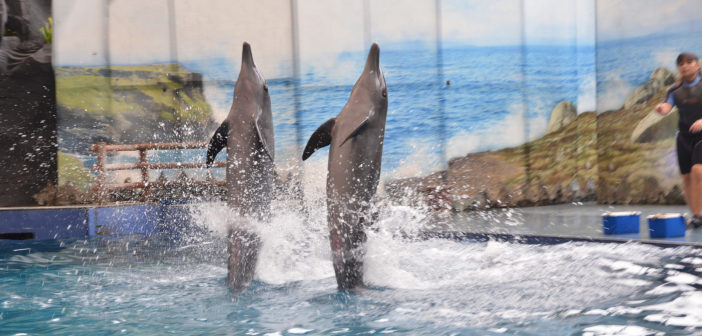Her Excellence Siti Nurbaya Bakar
Minister of Environment & Forestry
Ministry of Environment & Forestry Republic of Indonesia
Gedung Manggala Wanabakti Blok I Lt. 3
Jalan Gatot Subroto – Senayan
Jakarta 10270
Indonesia
Sitinurbaya_bakar@yahoo.co.id
menlhk@dephut.go.id
sitinurbaya.bakar@gmail.com
February 2017
__
Your Excellence,
We are writing on behalf of the Asia for Animals Coalition, representing international animal welfare and conservation organisations. We express our deep concerns with regards to the use of animals in performances in zoos and safari parks in Indonesia.
In recent weeks, there has been mounting media coverage and exposés of the inadequate care and treatment of animals in a number of zoos and safari parks throughout Indonesia; and our member organisations have received an increasing number of complaints from international tourists. The abusive and exploitative treatment of animals used in animal performances at these facilities is of particular concern, given the techniques known to be used to control the animals during training and performances.
Training and Performing:
- Animal trainers and showmen frequently engage in negative reinforcement, whipping and striking animals, forcing them to carry out unnatural tricks and demonstrating that the animals can only be “controlled” by pain and fear. Members of our organisations have personally witnessed the use of animals in Indonesian zoos and safari parks, as well as circuses, and have documented the animal trainers abusing the animals. Our colleagues at Scorpion Foundation who monitor and report on the facilities regularly have recently documented additional evidence.
- Performance acts in the presence of spectators are likely to cause severe stress to captive wild animals. Loud noise is a well-known stressor; acoustical stress within and outside the human hearing range can cause critical alteration in physiological parameters for captive animals.[1]
- Animals are often housed in small, barren enclosures and released from their confinement only for a few minutes during their performance and for training sessions. This can have significant negative consequences on behaviour and welfare. Normal behaviour gives way to a higher percentage of inactivity and/or increased abnormal behaviour, i.e. self-injury, and stereotypies[2]
Stress caused by such conditions can cause severe behavioural and physiological problems for captive wild animals.
The use of wild animals in such abusive performances also contributes to the desensitisation of society to animal violence as viewers, including young children, are taught to regard animals simply as objects to be used and abused for entertainment. This abusive treatment of animals serves no educational value and also leads to a negative international image of Indonesia, with tourists returning to their home countries reporting cases of animal abuse rather than highlighting the natural beauty and the rich cultural experiences which Indonesia is so famous for.
Globally we are seeing an ever-growing number of countries banning the use of wild animals in performances, with over 50 countries around the world already having passed progressive laws. Indonesia’s on going support animal exploitation in the name of entertainment in circuses and shows at zoos and safari parks is therefore in contravention to the trend we are seeing around the world of growing concerns for animal welfare and recognition of the wholly unacceptable abusive techniques relied on to create animal performances.
On behalf of our members globally, we appeal for you to join this international movement against the use and abuse of animals in performances, and to pass and enforce laws ending animal shows in captive wildlife facilities. We urge you to work with local and international groups to develop strengthened laws safeguarding animal welfare nationwide, ensuring wildlife facilities serve as venues of education and to promote conservation of wildlife, not animal exploitation and abuse.

Sent on behalf of the following organisations:
- Animal Guardians
- Animal People
- Animals Asia Foundation
- ACRES
- Blue Cross of India
- Change for Animals Foundation
- Elephant Aid International
- Federation of Indian Animal Protection Organisations
- Humane Society International
- International Fund for Animal Welfare
- Philippine Animal Welfare Society
- Royal Society for the Prevention of Cruelty to Animals
- Society for the Prevention of Cruelty to Animals, Hong Kong
- Society for the Prevention of Cruelty to Animals, Sarawak, Malaysia
- World Animal Protection
Copied to:
President Joko Widodo
President Republik Indonesia
Istana Negara
Jalan Medan Merdeka Utara
Jakarta Pusat 10110
Indonesia
president@ri.go.id
jokowi@gmail.com
Drs. H. Muhammad Jusuf Kalla
Wakil President Republik Indonesia
Jl Medan Merdeka Selatan 6 Kel, Gambir
Jakarta Pusat. 10110
Indonesia
Drs. Setya Novanto, Ak
Chairman of House of Representatives (Dewan Perwakilan Rakyat)
Gedung Nusantara III
Jalan Jenderal Gatot Subroto
Jakarta 10270
Indonesia
Executive Director
WAZA Executive Office
IUCN Conservation Centre
Rue Mauverney 28
CH_1196 Gland
Switzerland
cliff.hannan@waza.org
secretariat@waza.org
Mr. Bambang Hendroyono
Secretary General
Ministry of Environment & Forestry Republic of Indonesia
Gedung Manggala Wanabakti Blok I Lt. 3
Jalan Gatot Subroto – Senayan – Jakarta – Indonesia – 10270
banghen_11@yahoo.co.id
datakonservasi@gmail.com
Mr. Rasio Ridho Sani
Director General of Law Enforcement
Ministry of Environment & Forestry Republic of Indonesia
Gedung Manggala Wanabakti Blok I Lt. 3
Jalan Gatot Subroto – Senayan – Jakarta – Indonesia – 10270
rasiosani@yahoo.com
Mr. Bambang Dahono Adji
Director
Directorate of Conservation & Biodiversity, Ministry of Forestry
Gedung Manggala Wanabakti Bld Block VII 7th Floor
Jalan Gatot Subroto
Senayan
Jakarta 10270
Indonesia
ditkkh@gmail.com
pemolaan@yahoo.com
Dr H Rahmat Shah
President
Indonesian Zoo and Aquarium Association (PKBSI)
Jl. Harsono RM
No 10 Ragunan
Jakarta, 12550
Indonesia
pkbsi@izaa.org
Tony Sumampau
Secretary General
Indonesian Zoo and Aquarium Association (PKBSI)
Jl. Harsono RM
No 10 Ragunan
Jakarta, 12550
Indonesia
tsumampau@hotmail.com
Citations:
[1]Stoskopf, M.K. (1983) The physiological effects of psychological stress. Zoo Biology 2: 179-190
[2] Mason, G.J. (1991) Stereotypies: a critical review. Animal Behaviour 41: 1015-1037《刻板行为:一次决定性回顾》。《动物行为》,第41期1015-1037页。
(Featured image: dolphin show at Taman Safari location in Indonesia. Credit GREGORIUZ, CC BY-NC 2.0)





